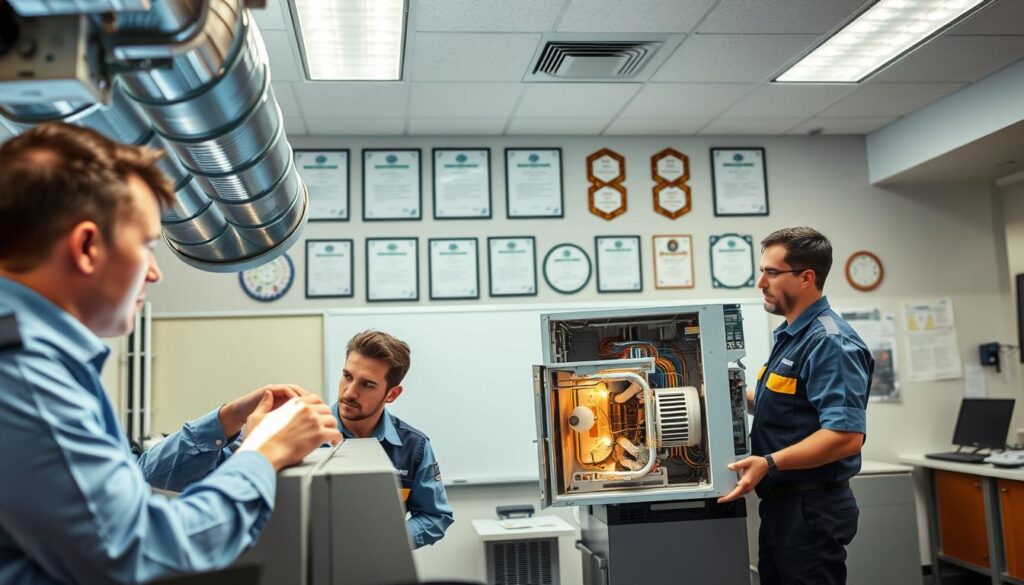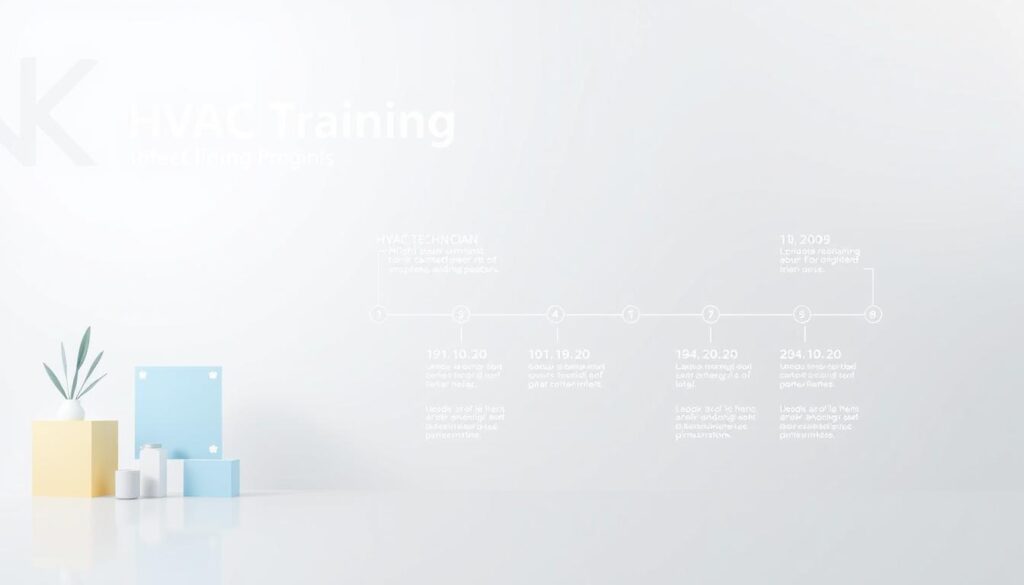Affiliate Disclosure
HVAC Guide Guys is a participant in the Amazon Services LLC Associates Program, an affiliate advertising program designed to provide a means for sites to earn advertising fees by advertising and linking to Amazon.
How Fast Can You Learn HVAC? Are you ready to dive into a career that transforms your technical skills into a lucrative profession? Have you ever wondered how quickly you can master the world of HVAC training programs?

The HVAC industry offers an exciting pathway for those seeking a dynamic technical career. With the U.S. Bureau of Labor Statistics projecting a steady 5% growth from 2021 to 2031, learning how fast you can learn HVAC has never been more critical.
Understanding the timeline for HVAC education depends on multiple factors. Different training routes offer varying speeds. Vocational schools can provide focused training in as little as 6 months. On the other hand, apprenticeship programs might extend to 3-5 years.
Your learning journey will involve mastering complex systems and understanding refrigeration cycles. You’ll also develop advanced troubleshooting skills. The speed of your progress depends on your dedication, learning style, and chosen educational path.
Key Takeaways
- HVAC training programs range from 6 months to 5 years
- Career growth in the HVAC sector remains consistently strong
- Multiple educational paths exist for aspiring technicians
- Individual commitment significantly impacts learning speed
- Technical aptitude plays a critical role in skill development
Table of Contents
Understanding HVAC Career Fundamentals
Exploring the HVAC world is exciting for those who love technical careers. Your journey starts with learning the basics of this vital industry.
HVAC technicians are key to keeping places comfy. They work in homes, offices, and factories. They need both technical skills and real-world knowledge.
Defining HVAC Systems and Components
Today’s HVAC systems are complex. They control temperature, humidity, and air quality. They include:
- Heating units (furnaces, heat pumps)
- Cooling systems (air conditioners)
- Ventilation equipment
- Refrigeration components
Basic Skills Required for HVAC Technicians
Good HVAC pros have technical and people skills. These are key for success in hvac certification courses and career growth:
- Strong math skills
- Mechanical aptitude
- Problem-solving skills
- Physical stamina
- Good customer service skills
Industry Overview and Career Prospects
The HVAC industry is booming, with lots of job openings. Here are some interesting facts:
| Metric | Details |
|---|---|
| Projected Job Growth | 15% between 2016-2026 |
| Certificate Program Duration | Approximately 9 months |
| Apprenticeship Length | 3-5 years |
“HVAC technicians are the unsung heroes who keep our environments comfortable and functional.” – Industry Expert
To become an HVAC pro, you need hard work, technical training, and a love for learning. Take on the challenge, and you’ll find a fulfilling career with many chances to grow and specialize.
Explore Our HVAC Shop
Looking for top-rated HVAC tools, parts, and accessories? Visit our shop and find the perfect solution for your needs.
Visit the ShopHow Fast Can You Learn HVAC?
Learning how fast you can learn HVAC depends on several factors. With the right approach, you can quickly start your journey in this dynamic field. Most aspiring technicians can get HVAC certification in less than a year through accelerated programs.
“Speed of learning is less important than depth of understanding in the HVAC industry.”
Your path to becoming an HVAC professional can vary. It depends on the educational route you choose:
- Certificate Programs: 6-12 months
- Vocational Training: 6-12 months
- Associate Degree: 2 years
- Apprenticeship: 3-5 years
Online training has changed how fast you can learn HVAC. Many programs offer flexible schedules. This helps you learn quickly while keeping your skills up to date. Technicians make up 64% of the HVAC/R workforce, with most completing training in 18 months.
Key factors for quick HVAC skill acquisition include:
- Personal commitment to learning
- Prior technical experience
- Quality of training program
- Individual learning aptitude
Pro tip: Choose an accredited program that provides both theoretical knowledge and practical hands-on training to maximize your learning speed.
The HVAC industry offers promising opportunities. It has a 4% growth rate by 2029 and a median annual wage of $48,730. Your learning journey is an investment in a stable, rewarding career.
Different Paths to HVAC Certification
Starting a career in HVAC needs careful thought about your education. The right training can lead to great hvac apprenticeship opportunities. It sets you up for success in your career.
There are many ways to start in HVAC. Each path has its own benefits and challenges. You can pick what fits your career goals and how you learn best.
Trade School Programs
HVAC trade schools offer detailed training. These programs last from 6 months to 2 years. They include:
- Comprehensive technical curriculum
- Hands-on laboratory training
- Industry-recognized certifications
- Potential job placement assistance
Apprenticeship Routes
HVAC apprenticeships are a great way to learn and earn. They involve up to 8,000 hours of work experience over four years.
“An apprenticeship provides real-world skills that classroom training alone cannot match.” – HVAC Industry Expert
On-the-Job Training Options
| Training Option | Duration | Key Benefits |
|---|---|---|
| Employer-Sponsored Training | 1-4 years | Direct industry experience |
| Community College Programs | 2 years | Associate degree + practical skills |
| Vocational Program | 35-45 weeks | Quick entry into workforce |
Choosing the right path depends on your situation, learning style, and career goals. Many HVAC technicians use a mix of training to improve their skills.
Pro Tip: Make sure you get certifications like EPA Section 608. It’s key for working with refrigerants and shows you’re a pro.
Explore Our HVAC Shop
Looking for top-rated HVAC tools, parts, and accessories? Visit our shop and find the perfect solution for your needs.
Visit the ShopAccelerated HVAC Training Programs
Are you eager to start your HVAC career? Accelerated HVAC learning programs offer a quick way to become a skilled technician. You can get certified in just 4-9 months.
Fast-track HVAC training is perfect for those who want to get into the field fast. These programs focus on practical skills, cutting down classroom time.
“Speed and quality can go hand in hand in HVAC training when the right program is chosen.”
- Typical accelerated program duration: 4-9 months
- Fastest completion time: As quick as 4 months at select schools
- Focus on core HVAC courses with minimal general education requirements
- Practical skills training prioritized over theoretical learning
Accelerated HVAC learning has many benefits:
- Faster entry into the job market
- Lower overall training costs
- Concentrated technical skill development
- Immediate hands-on experience
When picking a fast-track HVAC training, look at accreditation, certification prep, and job help. Some programs offer paid internships. This lets you earn while learning and gain work experience.
HVAC technicians can earn well, with average hourly rates over $27.55. Top earners make up to $38.89 per hour. Choosing an accelerated program can quickly lead to a fulfilling HVAC career.
Essential Components of HVAC Education
Getting into HVAC certification courses means learning a lot about technical skills and industry rules. You need to understand complex systems and how to use them in real life.
Technical Knowledge Requirements
Learning HVAC involves getting to know complex technical areas:
- Thermodynamics principles
- Electrical system fundamentals
- Refrigeration cycle mechanics
- System design and configuration
Hands-on Training Elements
Practical training is key in HVAC. Students do:
- Equipment installation simulations
- Diagnostic troubleshooting exercises
- Repair and maintenance workshops
- Live project implementations
Safety Protocols and Regulations
Good HVAC training also teaches safety:
| Safety Area | Key Focus |
|---|---|
| Electrical Safety | Low voltage system handling |
| Refrigerant Management | EPA certification requirements |
| Personal Protection | Proper equipment and procedure |
“Safety is not an accident—it’s a deliberate choice in HVAC professional training.”
Becoming an HVAC pro takes hard work, technical skills, and a love for learning. You must master both theory and practice to succeed.
Explore Our HVAC Shop
Looking for top-rated HVAC tools, parts, and accessories? Visit our shop and find the perfect solution for your needs.
Visit the ShopTime Investment for Different HVAC Programs

When looking at hvac training programs, knowing how much time they take is key. Each path has its own benefits and lasts a different amount of time. This lets you pick the one that matches your goals and schedule.
Here’s a breakdown of typical HVAC education timelines:
- Certificate Programs: 6-12 months
- Fastest way to start working
- Gives you the basic technical skills
- Great for those who want to start quickly
- Associate Degree Programs: 18-24 months
- Offers a full hvac education online
- Deeper technical training
- Prepares you for more advanced roles
- Apprenticeship Programs: 3-5 years
- Combines classroom and practical training
- Learn while earning a salary
- Best for full professional growth
“The right HVAC program can accelerate your career journey and open doors to exciting opportunities in the industry.” – HVAC Career Experts
Your choice depends on your career goals, how much time you have, and your budget. Online hvac education makes learning easier, letting you work and study at the same time.
Factors Affecting HVAC Learning Speed
Learning HVAC skills involves many factors that can greatly affect your learning journey. Your success depends on several key elements. These elements determine how quickly you can master this technical profession.
Different people start intensive hvac classes with unique backgrounds and abilities. Knowing these factors can help you improve your learning strategy and career growth.
Prior Experience and Technical Aptitude
Your existing technical background is key in learning HVAC skills. People with:
- Mechanical or electrical work experience
- Strong mathematical skills
- Hands-on problem-solving abilities
Usually learn faster in accelerated hvac learning programs. Natural talent for technical subjects can greatly shorten your learning time.
Study Commitment and Dedication
Success in intensive hvac classes needs consistent effort. Important commitment factors include:
- Regular study schedule
- Practical hands-on practice
- Continuous skill development
“Dedication separates good technicians from exceptional ones.” – HVAC Industry Expert
Program Structure and Intensity
The design of your training program greatly affects learning speed. Programs with a mix of theory and practice speed up skill learning.
By understanding these factors, you can plan your HVAC education better. This way, you can make the most of your learning in this fast-paced technical field.
Required Certifications and Licensing Timeline
Starting your HVAC career means getting the right certifications. These are key to becoming a skilled HVAC technician. Each certification has its own role in your journey.
Here are the main certifications you’ll need:
- EPA Section 608 Certification: This can take 1-2 weeks to complete.
- Type I: Small appliances
- Type II: High-pressure systems
- Type III: Low-pressure systems
- Universal Certification: Covers all types
- NATE (North American Technician Excellence) Certification: This takes 3-6 months to prepare for.
- Manufacturer-Specific Certifications: These take 1-3 months to finish.
State licensing rules change a lot. For example, Texas has its own set of rules:
- 48 months of supervised work experience
- EPA certification for refrigerant handling
- $20 application fee for HVAC Technician Registration
“Certification is not just a piece of paper – it’s your passport to professional credibility in the HVAC industry.”
Getting licensed can take 6 months to 2 years. This depends on your state’s rules and your education choice. Most programs need a high school diploma or GED. Training can last from six months to two years.
Investing in HVAC certifications boosts your career. Certified technicians earn more and have better job chances than non-certified ones.
Explore Our HVAC Shop
Looking for top-rated HVAC tools, parts, and accessories? Visit our shop and find the perfect solution for your needs.
Visit the ShopCost Considerations for HVAC Training

Choosing hvac trade schools means you need to plan your budget well. The cost of HVAC training can change a lot. It can be from $1,500 to $30,000, based on your education choice. Knowing these costs helps you decide on your career path wisely.
Different hvac training programs have different prices:
- Certificate Programs: Usually cost $1,200 to $15,000 and last 6-12 months
- Associate’s Degrees: Cost between $15,000 and $35,000 and take 2 years
- Apprenticeship Routes: Are the cheapest, costing $500 to $2,000 over 3-5 years
There are ways to make your training cheaper. Many schools offer:
- Scholarships just for HVAC students
- Federal and state grants
- Low-interest student loans
- Employer tuition reimbursement programs
“The right HVAC training is an investment in your future career.” – HVAC Industry Expert
Where you live also affects training costs. For example, prices vary by state:
- California: $7,500
- New York: $10,500
- Texas: $11,000
- Michigan: $5,600
Don’t forget to add extra costs like tools, exam fees, and licensing. The EPA 608 certification exam costs $40 to $240. Annual licensing fees can be $100 to $300.
Career Opportunities After HVAC Training
Your fast-track HVAC training opens up a world of exciting career possibilities. The HVAC job market is growing fast. It offers many paths for skilled professionals to build a rewarding career.
Entry-Level Positions
When you complete your hvac career preparation, several entry-level positions become available:
- HVAC Apprentice
- HVAC Helper
- Maintenance Technician
- Residential Service Assistant
Advanced Career Paths
As you gain experience, your fast-track HVAC training can lead to more specialized roles:
- Residential Service Technician
- Commercial Service Technician
- HVAC Contractor
- Facilities Manager
Salary Expectations
The financial prospects for HVAC professionals are promising. Here’s a breakdown of what you can earn:
- Average hourly wage: $27.55
- Entry-level hourly wage: $22.47
- Experienced technician hourly wage: $32.83
- Median annual salary in 2023: $57,300
“The HVAC industry offers stable, well-paying careers with significant growth for dedicated professionals.” – Industry Expert
With a 9% job growth by 2033 and opportunities in every U.S. state, your HVAC training investment is secure and lucrative.
Explore Our HVAC Shop
Looking for top-rated HVAC tools, parts, and accessories? Visit our shop and find the perfect solution for your needs.
Visit the ShopBenefits of Fast-Track HVAC Programs
Accelerated HVAC learning is a fast way to start a technical career. Fast-track HVAC training lets you learn key skills and get certified quickly. This is much faster than traditional learning paths.
These programs have many benefits for those wanting to be HVAC technicians:
- Rapid skill acquisition in as little as 6-9 months
- Faster entry into the workforce
- Reduced educational time investment
- Focused, practical learning experience
“Advanced HVAC training can increase service quality by 35% and dramatically improve career prospects,” industry experts report.
Key benefits of accelerated HVAC learning include:
| Benefit | Impact |
|---|---|
| Certification Speed | Can complete training in 11 months |
| Employment Opportunities | 40% faster employment rate |
| Earning Potential | 15% higher earnings for specialized skills |
| Job Satisfaction | 80% report increased satisfaction |
Your success in fast-track HVAC training depends on dedication, self-motivation, and a commitment to intensive learning. These programs are fast but require a lot of personal effort and focus. You need to quickly learn complex technical skills.
Choosing a fast-track HVAC program is a smart move for a rewarding technical career. You’ll develop skills fast and have great job prospects.
Conclusion
Learning about HVAC shows many ways to start a career in this field. You can prepare for an HVAC career quickly, with training from six months to several years. This flexibility lets you pick the best path for your learning style and goals.
The HVAC industry is full of chances for those who want to grow. It’s expected to grow by 14% and pay an average of $47,380 a year. Schools, colleges, and apprenticeships offer the skills and experience needed to thrive.
Success in HVAC isn’t just about how fast you learn. Getting certifications, staying updated, and mastering technical and safety skills are key. Whether you want a quick start or a long-term career, HVAC has many opportunities for those eager to succeed.
Choosing the right training and staying committed to learning can make your HVAC career rewarding. With chances for growth, good pay, and job security, HVAC is a great choice for those who love technical work and solving problems.
FAQ
How long does it typically take to learn HVAC?
Do I need prior technical experience to learn HVAC?
What are the fastest ways to become an HVAC technician?
What certifications do I need to work as an HVAC technician?
How much does HVAC training typically cost?
How long does it typically take to learn HVAC?
Do I need prior technical experience to learn HVAC?
What are the fastest ways to become an HVAC technician?
What certifications do I need to work as an HVAC technician?
How much does HVAC training typically cost?
FAQ
How long does it typically take to learn HVAC?
Learning HVAC’s time frame varies. Certificate programs last 6-12 months. Associate degrees take 2 years. Apprenticeships can last 3-5 years.
Accelerated programs are faster, finishing in 4-6 months. This lets you start working sooner.
Do I need prior technical experience to learn HVAC?
You don’t need prior technical experience to start. Many programs teach you from scratch. But, experience in mechanical or electrical work can speed up your learning.
What are the fastest ways to become an HVAC technician?
Fastest paths include certificate programs, online courses, and fast-track training. These can be done in 4-6 months. They give you the skills and certifications to start working quickly.
What certifications do I need to work as an HVAC technician?
You need EPA Section 608, NATE, and state-specific licenses. Most employers want the EPA certification first. You can get it quickly after your training.
How much does HVAC training typically cost?
Costs range from
FAQ
How long does it typically take to learn HVAC?
Learning HVAC’s time frame varies. Certificate programs last 6-12 months. Associate degrees take 2 years. Apprenticeships can last 3-5 years.
Accelerated programs are faster, finishing in 4-6 months. This lets you start working sooner.
Do I need prior technical experience to learn HVAC?
You don’t need prior technical experience to start. Many programs teach you from scratch. But, experience in mechanical or electrical work can speed up your learning.
What are the fastest ways to become an HVAC technician?
Fastest paths include certificate programs, online courses, and fast-track training. These can be done in 4-6 months. They give you the skills and certifications to start working quickly.
What certifications do I need to work as an HVAC technician?
You need EPA Section 608, NATE, and state-specific licenses. Most employers want the EPA certification first. You can get it quickly after your training.
How much does HVAC training typically cost?
Costs range from $1,200 for certificates to $30,000 for associate degrees. Community colleges and trade schools are often cheaper. Financial aid and scholarships can help pay for it.
Can I learn HVAC through online training?
Yes, online programs are available. But, hands-on training is key. Most programs mix online learning with in-person training to ensure you learn well.
What is the job outlook for HVAC technicians?
The job market for HVAC technicians is very promising. The Bureau of Labor Statistics predicts a 13% growth rate by 2030. This growth is due to more construction and the need for HVAC services.
Is HVAC a good career for someone who wants to learn quickly?
HVAC is a great choice for quick learning and job entry. With the right training and dedication, you can become ready to work in a short time. There are also chances for ongoing learning and career growth.
,200 for certificates to ,000 for associate degrees. Community colleges and trade schools are often cheaper. Financial aid and scholarships can help pay for it.
Can I learn HVAC through online training?
Yes, online programs are available. But, hands-on training is key. Most programs mix online learning with in-person training to ensure you learn well.
What is the job outlook for HVAC technicians?
The job market for HVAC technicians is very promising. The Bureau of Labor Statistics predicts a 13% growth rate by 2030. This growth is due to more construction and the need for HVAC services.
Is HVAC a good career for someone who wants to learn quickly?
HVAC is a great choice for quick learning and job entry. With the right training and dedication, you can become ready to work in a short time. There are also chances for ongoing learning and career growth.

